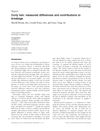 13 citations,
November 2012 in “International Journal of Dermatology”
13 citations,
November 2012 in “International Journal of Dermatology” Curly hair breaks more easily, especially with chemical treatments, but simpler grooming reduces breakage.
 7 citations,
November 2004 in “International Journal of Cosmetic Science”
7 citations,
November 2004 in “International Journal of Cosmetic Science” Hair breaks differently when wet or dry and is affected by its condition and treatments like perms and bleaching.
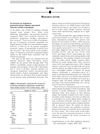 1 citations,
July 2021 in “Journal of The American Academy of Dermatology”
1 citations,
July 2021 in “Journal of The American Academy of Dermatology” Face mask-related injuries in U.S. emergency departments rose by 2400% during the COVID-19 pandemic, with most injuries being dermatitis and lacerations.
 1 citations,
May 2014 in “Lipid Technology”
1 citations,
May 2014 in “Lipid Technology” New cleaning surfactants, biofuel production plans, dairy expansions, improved lipid testing methods, and various product launches and developments were reported in lipid technology.
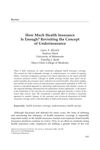 36 citations,
November 2006 in “Medical Care Research and Review”
36 citations,
November 2006 in “Medical Care Research and Review” The document concludes that there is no clear definition of adequate health insurance, and a consistent method to measure underinsurance is needed.
 13 citations,
March 2018 in “Journal of Sociology”
13 citations,
March 2018 in “Journal of Sociology” The anti-ageing treatment market is growing by exploiting fears of ageing with unproven promises, which could harm public trust and genuine science.
 8 citations,
June 2011 in “Nature Biotechnology”
8 citations,
June 2011 in “Nature Biotechnology” Stem cell treatments can potentially treat baldness, with one trial showing hair growth after injecting a hair-stimulating complex, and no safety issues were reported.
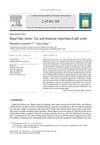 6 citations,
March 2012 in “Journal of Accounting Education”
6 citations,
March 2012 in “Journal of Accounting Education” Regal Hair Salon records gift card sales as liabilities and recognizes revenue when redeemed.
 4 citations,
January 2016 in “Acta dermatovenerologica Alpina, Pannonica et Adriatica (Tiskana izd.)”
4 citations,
January 2016 in “Acta dermatovenerologica Alpina, Pannonica et Adriatica (Tiskana izd.)” 5% minoxidil foam is a safe, effective treatment for male pattern hair loss, with increased hair count and few side effects.
 3 citations,
January 2015 in “Evidence-based Complementary and Alternative Medicine”
3 citations,
January 2015 in “Evidence-based Complementary and Alternative Medicine” Pumpkin seed oil may help hair growth, but more research needed on frontal hair loss and long-term effects.
 2 citations,
May 2021 in “Journal of pharmaceutical and biomedical analysis”
2 citations,
May 2021 in “Journal of pharmaceutical and biomedical analysis” A new method was developed to accurately detect and measure 47 different drug ingredients in various products.
 1 citations,
December 2021 in “International journal of research in dermatology”
1 citations,
December 2021 in “International journal of research in dermatology” Dermatologists should learn more about shampoos to better treat hair and scalp issues.
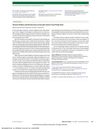 1 citations,
June 2018 in “JAMA Dermatology”
1 citations,
June 2018 in “JAMA Dermatology” Vitamin C was found to effectively treat prickly heat in children.
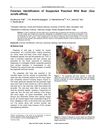 1 citations,
August 2016 in “Journal of Buffalo Science”
1 citations,
August 2016 in “Journal of Buffalo Science” The animal was likely a wild boar.
 March 2024 in “International Journal of Clinical Pharmacokinetics and Medical Sciences”
March 2024 in “International Journal of Clinical Pharmacokinetics and Medical Sciences” Herbal hair serums offer multiple hair and skin benefits and are becoming more popular.
 February 2021 in “Austin journal of nutrition & metabolism”
February 2021 in “Austin journal of nutrition & metabolism” Appropriate zinc levels may help prevent hair loss in university students.
 March 2014 in “Dermatologic Clinics”
March 2014 in “Dermatologic Clinics” More research, better treatments, and public education are needed for dermatological conditions in people of African descent.
 March 2013 in “Molecular & Cellular Toxicology/Molecular & cellular toxicology”
March 2013 in “Molecular & Cellular Toxicology/Molecular & cellular toxicology” m-Aminophenol in hair dye can cause skin cell toxicity and stress responses.

Obesity is linked to many gastrointestinal diseases and needs more research for treatment development.

Medical Hair Restoration added a non-surgical hair therapy program to help people with early hair loss.
 383 citations,
February 2011 in “Nature Reviews Genetics”
383 citations,
February 2011 in “Nature Reviews Genetics” DNA profiling in forensics has improved, but predicting physical traits and ancestry from DNA has limitations and requires ethical consideration.
 316 citations,
June 2017 in “Stem Cell Research & Therapy”
316 citations,
June 2017 in “Stem Cell Research & Therapy” Fat tissue-derived cells show promise for repairing body tissues, but more research and regulation are needed for safe use.
 295 citations,
September 2006 in “Cell Cycle”
295 citations,
September 2006 in “Cell Cycle” The conclusion is that using drugs to block the TOR pathway might slow aging and prevent age-related diseases.

The skin is a complex barrier for drug penetration, but understanding its structure and interactions can improve drug delivery methods.
 207 citations,
January 2011 in “Dermatologic Therapy”
207 citations,
January 2011 in “Dermatologic Therapy” Laser hair removal is the most requested cosmetic procedure and has become a scientifically-based treatment suitable for all skin types.
 188 citations,
October 2012 in “The AAPS Journal”
188 citations,
October 2012 in “The AAPS Journal” The document concludes that developing generic topical drugs requires ensuring they match the original in quality, composition, and structure, and often involves complex testing and regulatory steps.
 92 citations,
December 2012 in “Current opinion in genetics & development”
92 citations,
December 2012 in “Current opinion in genetics & development” Turing patterns are now recognized as important in developmental biology.
 88 citations,
July 2019 in “International Journal of Molecular Sciences”
88 citations,
July 2019 in “International Journal of Molecular Sciences” Using human fat tissue derived stem cells in micrografts can safely and effectively increase hair density in people with hair loss.
 72 citations,
July 2003 in “Journal of cosmetic dermatology”
72 citations,
July 2003 in “Journal of cosmetic dermatology” Frequent hair coloring and styling can damage hair and cause breakage or loss.
 60 citations,
January 2014 in “Anais Brasileiros De Dermatologia”
60 citations,
January 2014 in “Anais Brasileiros De Dermatologia” Nanotechnology in dermatology shows promise for better drug delivery and treatment effectiveness but requires more safety research.






























